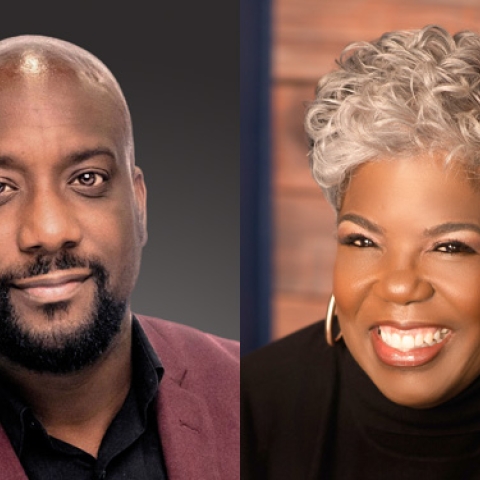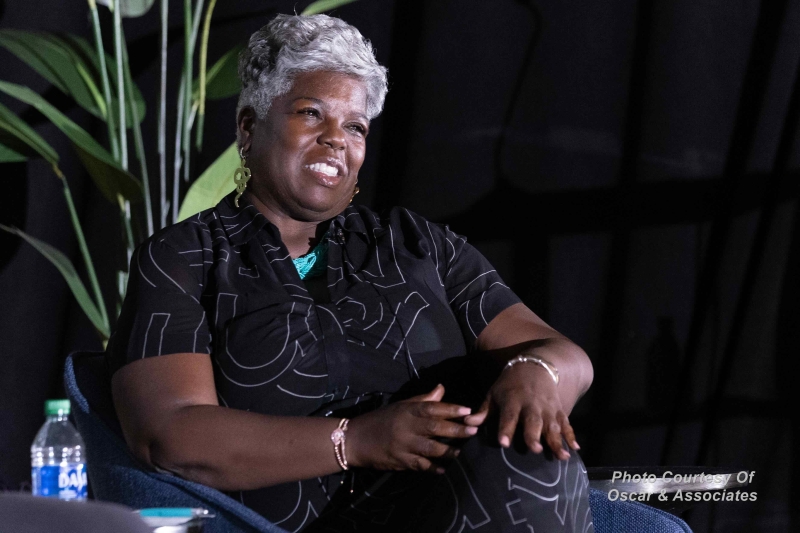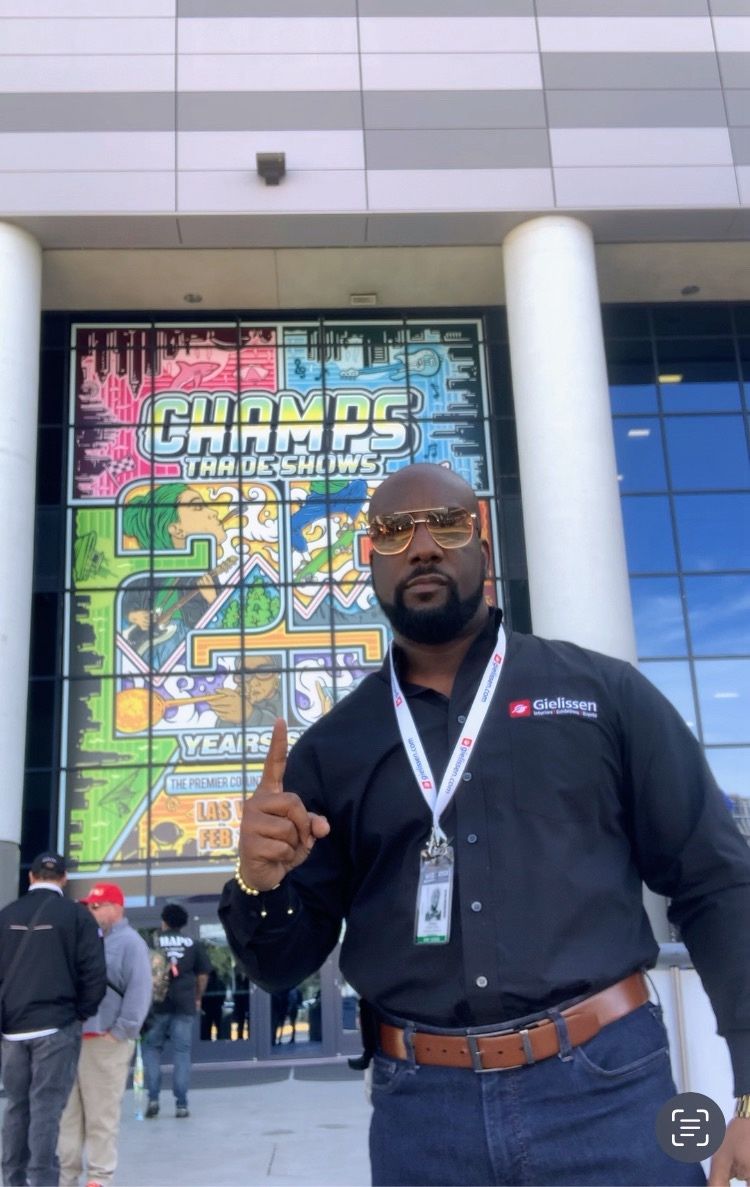Celebrating Black History Month 2024 With Freeman’s Marveen Hart and Gielissen’s Ed Jeffry

Taking place each February, Black History Month is an ideal time to honor and celebrate the achievements of Black people in the events and trade show industry and renew our commitment to continue fostering diversity, equity and inclusion (DEI).
We want to recognize and highlight Black industry leaders and share their experiences. This week, we are featuring Marveen Hart, Head of Diversity, Equity, and Inclusion, Freeman, a full-service exhibitions, exhibits and events company with a 97-year legacy, and Ed Jeffry, business development manager for Gielissen, a Netherlands-based exhibitions, events, general contracting and interiors company with 11 locations across three continents.
Find out who inspires Jeffry and what tips he can offer others to champion DEI in the events industry. Hart shares tips on how event professionals can champion DEI in the events industry and a personal story on the importance of Black History Month to her.
Marveen Hart, Head of Diversity, Equity, and Inclusion, Freeman

What she does: Marveen Hart serves as the Head of Diversity, Equity, and Inclusion for the Freeman, a global events company that is redefining live for a new era. Hart is an advisor, advocate, catalyst for change and institutional resource focused on infusing DE&I into experiences, tracking progress toward goals, and communicating progress to successfully attract, engage, develop and retain a diverse workforce and inclusive culture within the organization.
Previous experience: As the former vice president, DEI for United Way Worldwide, she was responsible for providing technical and programmatic leadership related to DE&I within the United Way network. In this role, she provided and shared tools, resources, best practices and trends related to inclusion to local United Ways in communities across the U.S. She offered leadership and direction for the continuous assessment and growth of network-wide efforts in building an inclusive culture. She served as an advisor to the CEO, President and senior leadership on the policies, programs, practices and resources needed to achieve excellence in the inclusion and equity space.
What tips would you share with fellow event professionals and the industry at large to champion DEI?
Leaders at all levels have a unique opportunity to embrace the new realities — growing a global workforce, demographic shifts and drastic marketplace changes. This new way of existing requires us all to be inclusive leaders. Leadership isn’t solely limited to those with official titles and status. No matter what your background, experiences and identities are, and where you are situated in the organization, it’s important to champion DE&I whenever you can through inclusive menu planning, neuro-inclusive meeting practices, and accessibility considerations and procedures. It’s up to you to lead inclusively from your seat.
From an interpersonal standpoint, start with a commitment to being a great ally. Pick a community or population that you know little about yet would like to understand better. From there start reading, listening to podcasts and seek out mentors from that community who are willing to pour into you, and/or connect as a mentee (where you can pour into them by encouraging, supporting and sponsoring that person). It’s a great way to broaden and deepen your knowledge and experience with a community or segment. Change lies in all of us — so get out of your own way and be an inclusive leader!
Will you share a personal story, memory or experience that highlights the importance of Black History Month to you?
We find ourselves at a time when people are questioning Black history. I have no problem shouting from the rooftops that “Black history is American history.” During my upbringing my parents, Black educators, and church leaders saw it as critical and imperative that we were grounded in our history and that we celebrated it. They didn’t rely on the school system to teach us as it rarely was addressed with the focus that it deserved.
During my elementary years, I attended an all-white Catholic school. It was a great institution, but at that time, not very welcoming of my sister and I who were the only children of color at the school. The very stern principal of the school who saw it as her responsibility to cover and protect us while we were in her care, approached me about developing and presenting on Black history in February (an assignment that she expected every year thereafter). It was quite a daunting assignment, but one where my classmates listened respectfully and learned from what I shared.
I knew then, and especially now, that there is an opportunity to understand Black history. And it’s about going beyond just racism and the enslavement of a people (which is still extraordinarily important for us to acknowledge and to grapple with). It’s imperative that we also spotlight and highlight Black achievement throughout our history.
Ed Jeffry, Business Development Manager, Gielissen

His background: After working remotely as a business development representative from his home office in Cleveland, he and his wife moved to Las Vegas in 2021. “I felt cut off from a thriving city, so we moved when I accepted a career in the exciting industry of experiential brand environments. I originally began my career as a sales manager with Hill & Partners. After moving to Las Vegas from Cleveland, where I worked in sales for more than 20 years in a wide range of industries — from banking to OSHA services and everything in between, the life-changing opportunity in the events industry has allowed me to utilize all my experiences and skills,” he said. “Las Vegas is a great place to live and work in this industry.”
His passion: “I have been trained by some of the industry's most successful and well-known leaders,” he said. “I enjoy networking and walking on the show floor, taking time to enjoy each day in attendance. My strength is my ability to communicate and build business relationships.”
Biggest challenge: His biggest struggle in the industry has been trying to get new inexperienced business development professionals introduced to this industry. “I was once in their shoes and believe the skill set of a business development professional is transferable to this industry,” he said.
Outside of work: “I am a huge boxing fan. I also enjoy shooting pool and lead a faith-based Men's Group,” he said.
What are you most proud of in terms of the ways your organization has been supporting the Black community?
As a company that is based out of the Netherlands with Dutch leadership, I have been embraced, celebrated and encouraged from the interviewing process to every step of the way. I’m seeing more people of color being added to the team. I represent our Las Vegas office as a Black man in this industry and have had the full support of leadership and team members from every location we have. When I landed Tyson 2.0, a Black-owned brand, as a client, the entire company supported me, and we were able to support that company with their international needs.
Who are some contemporary Black leaders, thinkers or artists who inspire you and how have they shaped your views or aspirations?
My father and my mother were my inspiration. I watched them go to work every day. I watched my father leave for work every morning at 5 a.m., driving a truck for more than 20 years. I watched my mom catch public transportation daily to work. I saw the resilience, the grind and the hustle. It has definitely shaped and inspired my work ethic.
What tips would you share with fellow event professionals and the industry at large to champion DEI?
Look at areas to add diversity to your team. Take part in events and opportunities to socialize and network with minorities in the industry or minorities attempting to get in the industry.
What advice would you give to individuals who want to be allies in the fight for racial equality and justice?
Speak up! Don't sit idle and watch injustice or discrimination. As Dr. Martin Luther King Jr. said, "An injustice anywhere is a threat to justice everywhere."
What is the most significant challenge facing Black event professionals today?
I believe the biggest challenge is getting into the industry. Because we have so few Black-owned companies in this industry, it can be challenging for new Black event prospects to get their foot in the door.
What is your advice for the next generation of Black leaders in the events industry?
Look at the adversity you had in the industry and ask yourself how can I eliminate those obstacles for the Black event professionals coming after you. How can you provide opportunities and education about this industry to minorities who are not aware of the opportunities in this industry?
Who are some Black event professionals to watch (up and comers)?
Kellie Murphy is a designer/project manager who was recently hired as part of the Gielissen Family. She is amazing and already beginning to make a name for herself in the industry. Dennis Taylor, who is the CEO/founder of Black Ops, is one of the few Black-owned and founded show services companies in the industry. Black Ops has years of experience of creating not only opportunities for minorities but also people of all ethnicities.
Will you share a personal story, memory or experience that highlights the importance of Black History Month to you?
Typically when we think of Black History Month, we think about Dr. Martin Luther King Jr., Malcom X, Harriett Tubman and others. However, I like to learn about the untold heroes of not only Black history but also American history. People like C. Alfred “Chief” Anderson who is one of the most famous of the pilots in the Tuskegee Airmen story. In 1929, Anderson had earned his pilot’s license and went on to become the first African American to earn a commercial pilot’s certification in 1932. Garrett Augustus Morgan Sr. was an American inventor, businessman and community leader. His most notable inventions were a type of three-way traffic light and a protective smoke hood, notably used in a 1916 tunnel construction disaster rescue. Most people have never heard of Creola Katherine Johnson, who was an American mathematician whose calculations of orbital mechanics as a NASA employee were critical to the success of the first and subsequent U.S. crewed spaceflights.
I was never taught about people like this in school, so I believe as we celebrate Black History Month it is equally important to educate ourselves on the history that is often hidden or even erased due to the racism and inequality in our country. Educating, researching and teaching Black history is the true way to celebrate Black History.


Add new comment